On page one Ellis Kaque (Kiowa) returned home and wrote back to tell of the negative reception he received when he tried to convince his Indian friends to live as white men and only believe in the Christian God. This page also had a letter from Dave Cheyenne on his Sunday school excursion to the Zoological Garden and his first encounter with…
Cheyenne
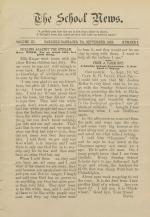
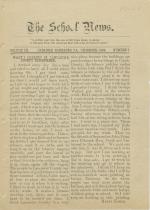
Page one featured Henry North's article about his outing during the summer in Lancaster County. North described his daily routine and explained what he learned. Page two had a piece about Christmas, in which all the students gathered in the chapel to meet with St. Nick. On the same page Calvin Red Wolf (Cheyenne) wrote to his father about his…
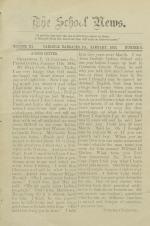
Page one was entirely taken up by a letter from Summer Riggs (Cheyenne), in which he discussed visiting friends and how a white man wanted to learn his actual name, Marchewa, in his native language. Page two mentioned issues that some Congressmen have with rules and conditions students at the school. There was also a letter from White Buffalo…
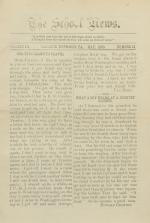
Page one reprinted Van Horn's letter to friend, in which he described his train ride into Trenton, New Jersey, and a drunken old man who disturbed him on the ride. Howard Chawhip also retold a story of an old drunkard who only went to church to hear the singing, but later became a good man after a fly caused him to uncover his ears during…
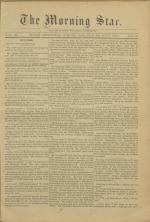
Page one is dominated by small vignettes of various day-to-day events that happened at the school, including compliments on students works, stories of gifted flowers and visiting agents. Page two has the beginning of an article titled “A Visit to the Indian Territory – Our Returned Pupils” which included a letter to Capt. R. H. Pratt. Page…
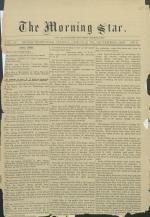
Page one had “Local Items” which consisted of small daily events such as the weather and games the students invented. Page two started with “A Plea for Greater Liberality in the Cause of Indian Education”, followed by “The People Responsible”, and “A Devoted Indian Missionary Dead”, which talked of the death of Dr. Stephen R. Riggs. Page three…
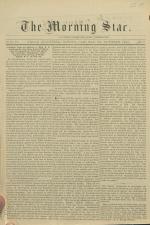
Page One had extracts from an address of Hon. B.G. Northrop Ex. Sec. State Board of Education of Connecticut. Page two had “Items of Interest From the Late Sioux Commission”, as well as a short piece on “What our Pupils in the Country Say.” Page three had short vignettes on various Local Items including returned students, weather and crops.…
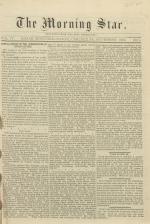
Page one opened with “Annual Report of the Commissioner of Indian Affair” which includes pieces on education, reports of the training schools. The page finished with a small letter to Miss Semple. Page two had Capt. Pratt’s account of his Western Trip, as well as information on the number of students at the school. Page three had the School…
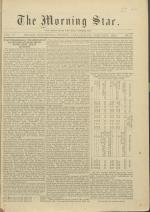
Page one opened with “What the Honorable, The Secretary of the Interior says his Annual Report About Indian Education”, which included statistics on treaties made with the various tribes. Page two had a piece called “ Hindrances and Helps” as well as a piece on young women helping to raise money for the school. Page three had a small bit about…
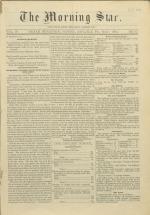
Page one began with a quick lesson on applied grammar, followed by “Secretary Teller’s views upon Indian Education and statistical information about the school, including student numbers, tribes attending and clothes in the sewing room. Page two had a call for more Indian schools to be made, as well as a an advertisement for $13,734 to…
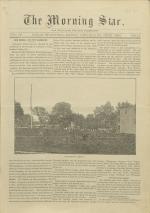
Page One had a photograph of the parade grounds on campus, as well as a bit of history on the Indian school. Page two had a small, horrifying piece on whether leaving Indians alone to die of illness or physically murdering them is more humane. The page also had extracts from the Address of Gen. George Crooks to the graduating class. Page three…
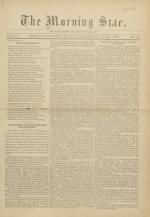
Page one had a poem titled “The Law of Liberty” followed by an article titled “The Republic in a Death Struggle with Ignorance” and comparison between the African and the Indian problem. Page two asked who was responsible for Indians having not fully “Christianized” and become “civil” and an article on the demoralizing old policy and how it has…
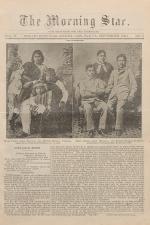
Page one started with a comparison photo of Mary Perry, John Menaul, and Bennie Thomas taken upon arrival at the school in July 1880, and then 3-4 years later, sometime prior to their first departure in June 1884. Following the picture was the annual report, which was continued on page four. Page two suggested integrating Indian children into…
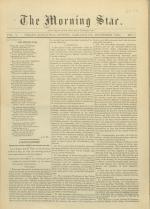
Page one started with a poem titled “The Indian’s Plea” by A.F.W., followed by a report on an organization made in 1822 to help get better rights for Indians. Included is their constitution and a list of the officers. This continued onto page two where the officer’s list was. Then there was an article on Penn’s Treaty with the Indians, which…
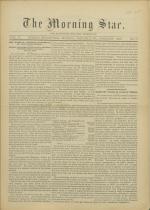
Page one opened with an extract from Hon. Byron M. Cutcheon speech, “Our Indian Policy,” originally given to the House of Representatives. Following that was “Secretary Teller in Favor of Schools.” Page two had a list of Bills and Resolutions relating to Indians that went before congress recently. Also on Page two was a letter from a Carlisle…
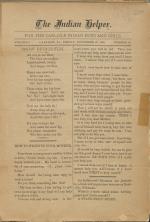
The first page opened with a poem titled “Snow Brings Fun” followed by “How to Write to Your Mother,” directed to a young man with instructions for how to reply to his mother who was pleading for his return home. Page two opened with a series of news items about President Cleveland, the death of Vice President Thomas Hendricks, events at the…
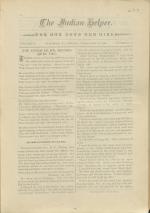
The first page opened with the poem, "You Conquer Me, Me Conquer You" followed by a letter from Rev. Edward F. Wilson of the Shingwauk Home titled "An Indian School in Canada," which described Wilson’s report to the Indian Department of Canada on his visit to Carlisle, the Lincoln Institute and the Hampton Institute. It continued on the last…
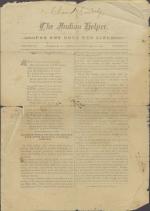
The first page opened with a poem titled “New Every Morning,” followed by "An Indian Woman Fought For Her Husband After Receiving a Beating From Him" which concluded on the fourth page. Page two gave news from the Chemawa and Genoa Indian Schools, and "A Nice Pocket Book for the Best," asking for wish lists from the trade departments. Next came…
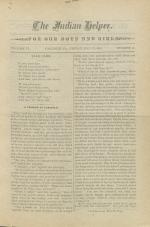
The first page opened with the poem "Take Care" followed by "A Visitor at Carlisle" which provided the opportunity to present arguments for Indian education away from the reservations. It continued on page four. Page two opened with an account of a presentation by "Dr. Harmon and Col. Thomas," a Dickinson College professor and his former…
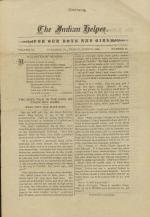
This issue opened with a poem titled “A CLUSTER OF NEVERS,” from Selected, followed by a fictionalized conversation between two boys traveling to their homes in the west from Carlisle titled “TWO BOYS TALK IN THE CARS ON THEIR WAY HOME: WHAT THEY MAY HAVE SAID.” In the conversation, “Ira” and “Bart” muse about their appreciation of…
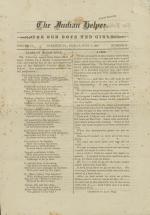
This issue opened with a poem titled “CLASS OF INDIAN BOYS,” written by a Quaker farm wife about a group of Outing students. The next article was titled “A TRIP” by Katie Grinrod (Wyandotte), which gave the account of her and Clara Cornelius’(Oneida) trip to Philadelphia with their Outing family. Page two opened with “A Better Chance” that…
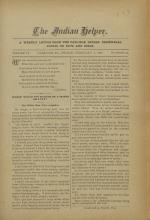
The first page began with an untitled poem that opened with the first line “We can never be too careful,” followed by “Which Would You Rather Be a Spider or a Fly? / The White Man Like a Spider,” an account of Mr. Seger’s description of the idiosyncrasies of language translation. It continued on the fourth page. Page two featured news articles…
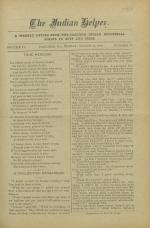
The first page began with a poem titled, “True Heroism,” followed by a fictional conversation among two Indian School students, Tom and Phil as reported by the Man-On-The-Band-Stand. In the moralizing story, continued on the fourth page, Phil sets a good example by keeping the Outing System rules, while Tom broke the rules and tainted the…
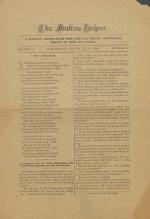
The first page began with a poem titled “My Kingdom,” followed by a story told by the Man-on-the-band-stand called “An Indian Boy in Ohio Whispers His Story of a Hard Row on the River.” The story described how an Indian student survived a dangerous storm in a boat with his companions. Page two opened with a letter “From Peter Powlas, Oneida,”…
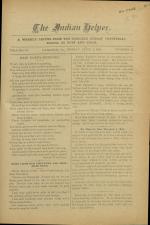
The first page opened with a poem by Susan Coolidge titled “New Every Morning,” followed by a letter from Ernie Black (Cheyenne) titled “News from our Cheyenne and Arapahoe Boys.” Also on the page was a reprint from The Sunday School Times titled “We Must Be Run Through a Mill.” Page two opened with a quote from Paul Boynton (Arapho)…
